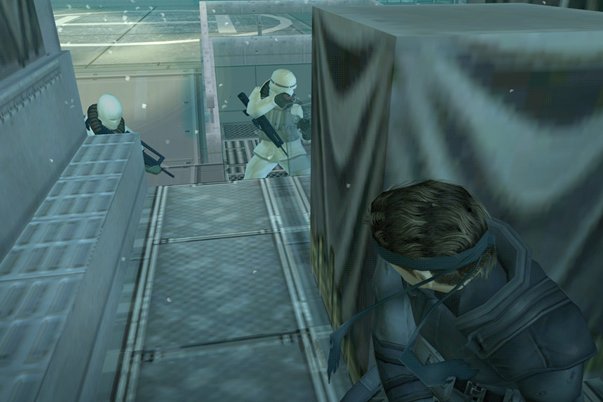Franchise Founders
The biggest games of the biggest names

Metal Gear Solid(Playstation - 1998 - 16 games, not counting remakes)
Sneaky Solid Snake works his way through a frozen battlefield to stop a group of nuclear-powered terrorists. Oh, and they have a walking tank named Metal Gear. And they just love to talk. A lot.
Why it soared
A perplexing blend of cinematic cutscenes, confusing plot twists and dead-on stealth gameplay. When this was first released, many games had any one of those traits, but none had all three bundled into one package. Sneaking around undetected was one of the biggest thrills, and you were required to do it repeatedly. Covertly maneuvering through ducts, shadows and unlit hallways was the way to win, not blasting everyone in sight. If you did, guards would erupt from all angles in active pursuit, forcing you to fight them down and expose yourself even further, or find a more appropriate place to hide until the alarm subsided. Eccentric enemies like Vulcan Raven and Revolver Ocelot added a sense of mystery and science fiction weirdness to the otherwise military-heavy developments. Silly effects, like the bright red exclamation points and dizzy "KO" stars kept everything a little lighthearted, even if the dialogue-soaked plot involved war for profit, genetic manipulation, cloning and nuclear annihilation. Perhaps the most famous quirky aside is Psycho Mantis, a creepy boss who could read your memory card and talk trash about your gaming taste. Add a dramatic soundtrack and some superb voice acting and you've got a game that's as cinematic as it is fun to play.
What it did for the franchise
Solid is the third game in the series, released in 1998. The second, which wasn't even released in the US at the time, hit Japan in 1990. That's eight whole years of nothing. In other words, this was one dead franchise. Then, in one carefully thought-out entry, this series rocketed out of the grave and became one of Konami's biggest moneymakers. The unique mixture of stealth, action, suspense, freak out moments and whacked-out super villains proved so successful that it was copied again and again for the game's many sequels. To fill in the gaps between numbered releases (part two didn't come out until 2001, three in 2004), the series saw several remakes and revisions. Substance, Subsistence, Integral and The Twin Snakes retold the story with added content, while Ghost Babel, Snake's Revenge and Acid explored alternate realities for Snake to conquer. The series is so popular that four of the 16 games we counted are still slated for release. Four games in development for one franchise? Sounds like a big deal to us.
Who it inspired
The most direct line can be traced to another successful spy series - Splinter Cell. Its antagonist, Sam Fisher, lives a decidedly less complex life than Solid Snake, but still gets called on for the same kind of stuff - sneak in here, snap this dude's neck, slink through this tunnel, push this button, yak for 30 minutes then get the hell out of there. After Fisher, things start to get really ugly, as Snake initiated something of a stealth craze in the late '90s and early '00s, giving us such wonders as Rogue Ops and Spy Fiction. The frenzy for stealth content also led to sneaky segments in games like Hulk and Chicken Run, plus the basis for Sly Cooper. Solid Snake helped make stealth action its own sub genre, though it was aided in part by super-shooter GoldenEye 007 and Tenchu: Stealth Assassins. On that note, however, what have either of those franchises done for us lately?
Weekly digests, tales from the communities you love, and more
A fomer Executive Editor at GamesRadar, Brett also contributed content to many other Future gaming publications including Nintendo Power, PC Gamer and Official Xbox Magazine. Brett has worked at Capcom in several senior roles, is an experienced podcaster, and now works as a Senior Manager of Content Communications at PlayStation SIE.



